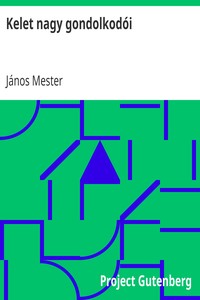Kelet nagy gondolkodói by János Mester
Kelet nagy gondolkodói by János Mester is a scholarly study of Eastern philosophy written in the early 20th century. Centered on how potent ideas shape individuals and nations, it defends the serious study of Asian thought and begins by mapping Indian traditions from the Vedas to the Upanishads, with special attention to ritual versus inner knowledge and the concepts of brahman and atman. The work promises a wide, historically grounded survey of
major Eastern thinkers and systems. The opening of the work argues that books and ideas govern both public morals and personal character more powerfully than sensational literature, and it urges readers to seek ideas at their sources. It rebuts the notion that the East has only religion and no philosophy, calls for a synthesis that respects culture and epoch but emphasizes great individuals, and outlines the factors shaping the history of philosophy (universal human problems, cultural context, and personal genius). It then sketches the “Indian soul” as yearning for unity and inner peace, inclined to mystic contemplation, often passive and pessimistic, yet sustained by karma and rebirth. From there it introduces the Vedas: the four collections and their priestly functions; the layers (Samhita, Brahmana, Upanishad, Sutra); and the split between outward ritual law (dharma) and inward wisdom (brahman). A brief survey of the Rigveda traces a movement from high monotheistic tones (Varuna) to polytheism and henotheism (Indra), early doubts, and an initial heaven–hell scheme later giving way to transmigration. The section closes by developing the Brahmana and Upanishadic turn to brahman (the absolute and the sacred word) and atman (the self), their identification in the vedanta (“tat tvam asi”), and the four states of consciousness culminating in the ecstatic union. (This is an automatically generated summary.)
Read or download for free
Not sure how to start? Reading Guide
| Reading Options | Url | Size | |||
|---|---|---|---|---|---|
| Read now! | https://www.gutenberg.org/ebooks/76238.html.images | 463 kB | |||
| EPUB3 (E-readers incl. Send-to-Kindle) | https://www.gutenberg.org/ebooks/76238.epub3.images | 254 kB | |||
| EPUB (older E-readers) | https://www.gutenberg.org/ebooks/76238.epub.images | 257 kB | |||
| EPUB (no images, older E-readers) | https://www.gutenberg.org/ebooks/76238.epub.noimages | 246 kB | |||
| Kindle | https://www.gutenberg.org/ebooks/76238.kf8.images | 475 kB | |||
| older Kindles | https://www.gutenberg.org/ebooks/76238.kindle.images | 446 kB | |||
| Plain Text UTF-8 | https://www.gutenberg.org/ebooks/76238.txt.utf-8 | 394 kB | |||
| Download HTML (zip) | https://www.gutenberg.org/cache/epub/76238/pg76238-h.zip | 233 kB | |||
| There may be more files related to this item. | |||||
Similar Books
About this eBook
| Author | Mester, János, 1879-1954 |
|---|---|
| Title | Kelet nagy gondolkodói |
| Original Publication | Budapest: Franklin-Társulat, 1928. |
| Series Title | Kultura és tudomány |
| Credits | Albert László from page images generously made available by the Hungarian Electronic Library |
| Reading Level | Reading ease score: 63.8 (8th & 9th grade). Neither easy nor difficult to read. |
| Language | Hungarian |
| LoC Class | BL: Philosophy, Psychology, Religion: Religion: General, Miscellaneous and Atheism |
| Subject | Philosophy, Chinese |
| Subject | Philosophy, Indic |
| Category | Text |
| EBook-No. | 76238 |
| Release Date | Jun 7, 2025 |
| Copyright Status | Public domain in the USA. |
| Downloads | 109 downloads in the last 30 days. |
| Project Gutenberg eBooks are always free! | |

